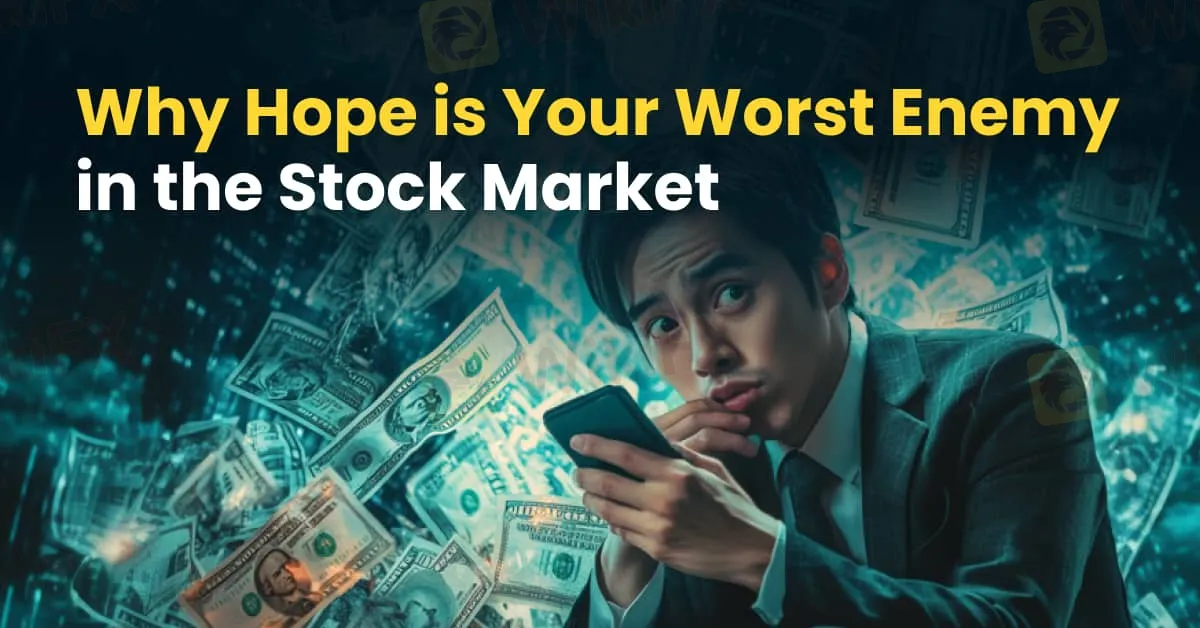简体中文
繁體中文
English
Pусский
日本語
ภาษาไทย
Tiếng Việt
Bahasa Indonesia
Español
हिन्दी
Filippiiniläinen
Français
Deutsch
Português
Türkçe
한국어
العربية
Why Hope is Your Worst Enemy in the Stock Market
Abstract:In the world of equity investing, few forces are as quietly destructive as the investor’s own sense of hope. This psychological trap often known as the "illusion of luck" convinces retail investors that they are among the fortunate few who can defy market logic. More often than not, it ends in losses, disillusionment, and a harsh lesson from the market.

In financial markets, the most expensive mistakes rarely come from bad data or bad timing, but from bad thinking. At the heart of many retail investors‘ losses lies a subtle yet powerful psychological trap: the illusion of luck. It convinces traders that they’re the exception to the rule, that this time will be different, until its not.

Selective Memory
Retail investors tend to remember their rare wins, like catching a stock just before it surges, while conveniently forgetting the many losses that followed. This biased recollection fuels the belief in their own “market sense,” when in reality, the odds were simply in their favour once.
Overconfidence
A few lucky trades can lead to dangerous overconfidence. During bull markets, countless investors misinterpret their short-term success as skill. But when the tide turns, these same individuals often suffer heavy losses, having mistaken momentum for mastery.
Anchoring Bias
Many investors obsess over their buy-in price, convinced the stock will rebound “eventually.” But markets dont operate on hope. Sticking stubbornly to a poor position only deepens losses, tying up capital that could have been used more effectively elsewhere.
The Gamblers Fallacy
Some, after a significant loss, double down in hopes of a big comeback. This is a mindset eerily similar to gambling. This often ends in ruin, especially when leverage is involved. The more one loses, the more desperate the bets become.

These mental traps have tangible, sometimes devastating consequences:
- Trapped Capital: Investors clinging to failing stocks often miss opportunities in stronger assets. Evergrandes collapse in 2021 left many waiting for a bailout that never came, while other sectors surged.
- Leverage Blow-Ups: The belief that “this time is different” encourages risky behaviour. During Chinas 2015 crash, margin traders wiped out their portfolios in days.
- Emotional Chaos: Constantly reacting to hope and fear destroys investment discipline. While institutions hold stocks for over a year, retail investors average less than 30 days, which is also a key reason why they underperform.
- Missed Opportunities: By fixating on weak stocks, investors miss the long-term compounding gains of market leaders. Statistically, 80% of returns come from 20% of stocks and the hopeful rarely hold the right ones.

To thrive in the market, investors must replace emotional decision-making with disciplined structure. This begins with setting clear exit rules. For instance, adhering to a 7% stop-loss can help contain losses before they spiral out of control. It‘s also crucial to recognise the role of luck; one successful trade does not indicate mastery, and long-term success relies on repeatable, well-defined strategies rather than fortunate flukes. After a loss, investors should resist the urge to jump back in with “revenge trades.” Instead, they should pause, reflect, and analyse what went wrong to avoid compounding their mistakes. Finally, it’s essential to adopt a probabilistic mindset: before each trade, ask whether the strategy has a track record of success over time and whether the risk-reward profile makes sense. The goal is not to hit one big win, but to build a system with consistently positive expected outcomes.

The cold reality of markets is this: they punish arrogance, ignore hope, and reward discipline. Success doesn‘t come from believing you’re lucky. It comes from building a process that survives good times and bad.
As Warren Buffett put it:
“Rule number one: never lose money. Rule number two: never forget rule number one.”

Disclaimer:
The views in this article only represent the author's personal views, and do not constitute investment advice on this platform. This platform does not guarantee the accuracy, completeness and timeliness of the information in the article, and will not be liable for any loss caused by the use of or reliance on the information in the article.
Read more

Tradu Joins TradingView for Seamless CFD and Forex Trading
Tradu, a global trading platform, integrates with TradingView for seamless CFD and forex trading, offering transparency, tight spreads, and fast execution.

Protect Your Portfolio in the Storm | What Are Safe Haven Assets?
Gold surged to an all-time high on Tuesday, driven by renewed weakness in the US dollar, ongoing trade war tensions, and critical remarks from President Donald Trump aimed at the Federal Reserve. These factors fuelled strong demand for safe-haven assets, pushing bullion above US$3,485 an ounce for the first time. But what exactly are safe haven assets? Why is everyone raving about them?

SEC Warns of Love Scams and Pig Butchering Investment Schemes
SEC's new campaign warns about relationship investment scams, highlighting red flags, losses, and protective measures. Stay safe from "pig butchering" schemes.

WeTrade Secures CySEC License to Expand EU Trading Services
WeTrade secures a CySEC license, allowing EU-wide operations. The approval boosts services, partnerships, and trust across the global trading community.
WikiFX Broker
Latest News
eXch Exchange to Shut Down on May 1 Following Laundering Allegations
How a Viral TikTok Scam Cost a Retiree Over RM300,000
JT Capital Markets Review
FCA Proposes Simplifying Investment Cost Disclosure for Retail Investors
Fresh Look, Same Trust – INGOT Brokers Rebrands its Website
FCA Issues Alerts Against Unauthorised and Clone Firms in the UK
Consob Orders Blackout of 9 Fraudulent Financial Websites
Tradu Joins TradingView for Seamless CFD and Forex Trading
Japan Issues Urgent Warning on $700M Unauthorized Trades
Silver surges past $33—are you ready for what comes next?
Currency Calculator


